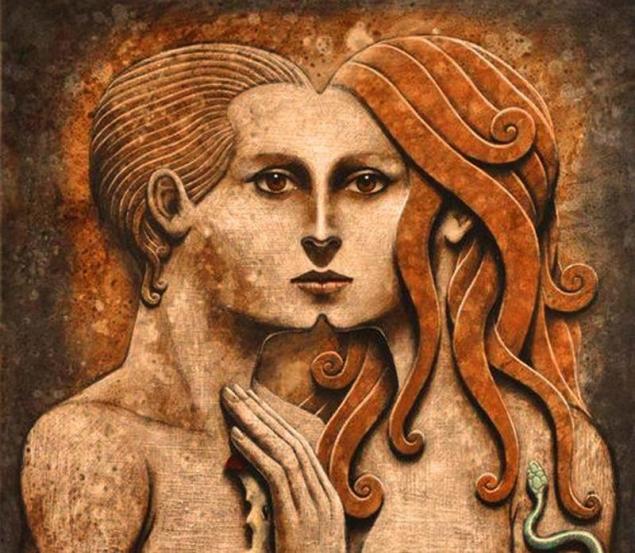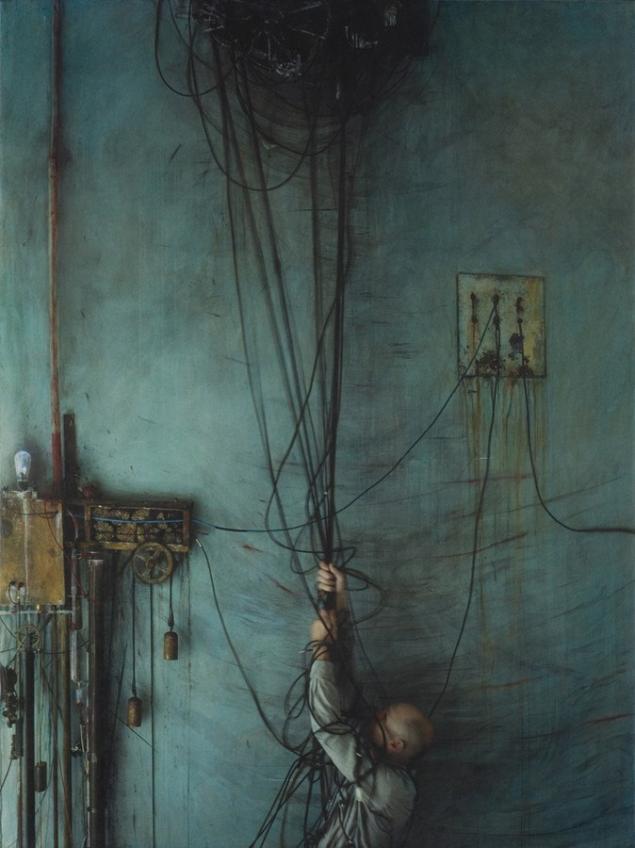The worst motive for marriage and relationship
 Bashny.Net
Bashny.Net
The reasons that motivate people to engage in marriage and in relationships in General, can have different properties.
If you try to consider them from the point of view of influence on future relationship/marriage, then it is conditionally possible to divide them into "productive" and "counterproductive."

Checking with the dictionary in part the meanings of these adjectives.
Productive — creating value, generating results; productive, fruitful.
Counterproductive — resulting in negative outcomes that are harmful.
That is, conventionally can take as the reference coordinate system this understanding: productive motives for entering a relationship/marriage provide in the future, the Union is fruitful bringing desired and valuable to the parties the results, counterproductive motives, respectively, lead to the creation of relationships that are prejudicial to the parties to the Union and leading to negative results for both.
"Productive" motives can be considered those least tied to the achievement of the objective to compensate in some respects "personal deficiencies" at the expense of the partner. Relations initiated by such motives, have the most favorable outlooks. Not without reservations, of course, on the ability of partners consistently implement the evolution of the relationship.
However, often there are "psychologically counterproductive," the motives of one or both of the partners when entering into relationships and/or marriage.
So:
1. "She was his flour loved, and he her – in compassion to them."
This is the case when relationships are built on logic, a kind of "healing" each other. One love (figuratively speaking, of course) "out of pity", the other "out of gratitude" for participation. In some sense, such a relationship will resemble something like "a psychological deal" where each partner receives their portion of the adoption to Others only in exchange for reciprocal acceptance. Sort of a "give-to-give". The complexity of such a Union can occur based on the difference in understanding of "proportionality" such exchange between the partners and permanent persistent expectations equilibrium return for any kindness or care. Otherwise, will be born of resentment of the type: "Here I am... And he(a)!!!".
It could be several different version of such a motive – "broken unbeaten luck" — when both partners enter into a relationship of meaning "to undergo treatment on the other." Poor prognosis is based on the fact that such relationships are, in fact, take two, relatively speaking, psychological "disabled". In an effort to "find a cure" in Another, the two "invalid" inevitably trying to push responsibility for his inner sense of well-being of each other. Two "disabled" on the legs are not stronger than one. So over time in such a pair will start to accumulate resentment and frustration associated with failure to meet expectations. Or happens the required "cure" of one/both partners in a different way, and they may find that more of them do not bind.
2. "Looking at you in the mirror"
Relationship, built on illusory sense of similarity, surface similarity with the partner. "He/she loves Mandelstam, hates mushrooms and condemns the demographic policy of the former President of Uruguay! He(a) I! And, so we get along well!" Here a poor prognosis is associated, first, with the illusion of complete similarity, because the similarity is impossible, even between the twins. This means that with time will certainly show up and the distinction is difficult to make partner, focused only on the search of community, as the Foundation of the relationship. Secondly, the very fact of human development suggests some dynamics, ie anyone not in a lifetime "freeze" and remain unchanged, which ultimately can lead to the fact that in this pair over time similarities will be less, and the differences become more and more.
3. To
The relationship in this case was initiated by the desire not to be alone. This motive is initially associated with manipulative, something the consumer (psychologically) position relative to the partner, when one is only a means to an end of the other. This purpose in this case is the desire to compensate for their fear of failure sense of self, which necessarily requires "attribute", confirming his right to Be. Such a motive of creating a relationship devoid of any hint of ability to see Another that is essential for a successful relationship. As they say, can't be one – don't get married (not marry)!
4. "Adopt me!"
In this case, the reasons for entering a relationship associated with the finding of some substitute of a real parent figure to "provide" from a partner that was unable to obtain from the real parent – adoption, care, participation, protection, warmth and attention. However, he seeks to acquire power over Another by manifestations of weakness and helplessness. If the second partner is Mature, it is likely that he will strive psychologically to swallow infantile. If the "babe" will begin to resist this takeover, first manifests and attempts to emancipate itself can cause the partner to anger and irritation. In fact, such a Union has all the prerequisites to engage in destructive psychological games in the "Poor Victim" and "Cruel Tyrant". Such a relationship will be doomed especially if the partner assigned to the role of the parent is not interested in it (or, on the contrary, he is in need of "adoption" — it will be a type of relationship "broken unbeaten luck").

5. "Warmed up, robbed..." ©
Walked down the street a little
Turned blue and was shivering...
The following "malignant" reason for the establishment of relations will be similar to the motif of the old woman from this famous poem: "warm orphan." People with such motivation enters into a relationship with the goal of implementing them in their "parental" aspirations: to take care of a partner as their child, make decisions for him, control and discipline, guided by ideas about the generosity and wanting to realize the need for power. After all, with such a man ("poor orphan girl") he can feel Big, Strong and Substantial. At first glance it may seem that a partner is perfect typecasting, seeking "adoption" (see Chapter 4). However, the trap here is that a type 4 wants the "adoption", and the type No. 5 who wants to "adopt", both are keen to play on Another identical aspirations associated with the desire for power, only they sell it through different strategies – the first using the game to weakness and helplessness, similar to the weakness and helplessness of the child, through which parents monitor and manage and the second is through development based on Another of his will, opinions, sentiments, etc. In the case if the partner of the "adopter" will not see any tangible benefits from this situation or even more have expressed a desire for autonomy and independence, the forecast for the development of relations also unfavorable. It should be added that describes the motif of the "adopter" can be found in women who are in relationships to be a Mother to your man, to educate him and "make man".
6. "In spite of aunt frostbitten ears!"
In this case, born of a relationship built not so much from a desire to be with Others, how to create those relationships in spite of, to spite someone.
In spite of a)ex b)parents to prove the right to "be an adult and independent." In this case, the relationship is not a goal but a tool, and a partner does not equal the Other, and the tool is identical to the partner category No. 3. Only added to that "running away" FROM something, the person is not quite aware what exactly he's running.
If the motif is associated with the revenge against your ex (or something like that "like cures like"), a relationship can start without any attempts to assess how a new partner may be close and interesting or, at worst, in any "suitable" for "the fugitive" as an individual with their own personality. This threatens, at least, the early onset of irritation, disappointment from relationships associated with the sense of otherness of the Other.In such a relationship will inevitably be Intrusive comparing a new partner with the previous one, as a rule, not in favor of the new. Moreover, the backlog of grievances in the previous may well recoup on a new, even unintentionally.
7. "All ran — and I ran!"
Here the motive of creating a relationship based on fear of otherness, fear to be different not for the better, the fear of condemnation. In this case we can talk about the self destructive type of person, when the support point on which to build the picture of yourself, is not within the person (as it should be), but is placed outside, in a world society. A man driven by the desire "to be, not worse than others", and this is what he wants, he can guide the decision to enter into a relationship. The danger of this motive lies, first, in the obvious for this tiankoura "promiscuity" when choosing a partner, entailing the risk of being in a relationship with an alien or even dysfunctional Others. Secondly, the partner in such a relationship is doomed to perform a certain "function", rather than to exist as a full and equal participant in the relationship. This can give rise to many expectations in relation to the partner, which not always come true, and, therefore, destined to become the reason for "collecting" grievances and complaints to him.
In conclusion, we can say that in some cases these types of motives may be not alone, and some weaves. For example, in the motif of the "adopter" can seamlessly exist a component of "she for the suffering of loved...", and the motif of "the fugitive" component "to be".
All of these motives are insidious, mainly because are unconscious. Of course, hardly anyone of sound mind and memory seriously says to himself something like: "Oh! This partner will help me meet my unconscious need and it will choose!". Unconsciously – because so called, that their understanding and recognition of their existence in General is not just difficult but almost impossible alone, because they lie beyond the capabilities of-awareness. To guess about their existence and "work" the man usually starts when he is pursued by systematic failures, difficulties and disappointments in relationships that are not only repeated, but also look similar, typical in different attempts with different partners, or when in a relationship with the same partner formed some "chronic", can not be solved when all efforts complexity.
Perhaps, too will open American psychological article announcing that the participation of a psychologist, psychotherapy is the most fast, accurate and environmentally friendly tool that helps you find exactly what motives and unconscious needs interfere with the person to build successful partnerships, and to correct them. Psychotherapy will help to understand such complex issues, which have professional titles "complementary marriages", "codependency", "play traumatic scenarios relations", "triangulation", "addict suffering", etc., consideration for which I deliberately avoided in this article in order not to overload it with excessive academic, and which to a certain extent can explain the "thrust" of a man to considered counter-productive to the motives of partner selection in relations.

If you try to answer the question what motives the creation of a relationship between a man and a woman can be the most favourable, providing the basis for fulfilling, harmonious relations, we can say that these are motives that are not associated with the desire to allow for the expense of the relationship and the partner's own deficits, to compensate thus your perceived or real imperfections, smooth out the "roughness" of the internal picture of Ya.
A favorable prognosis will be the case, if in a relationship one person is ready to "meet" as I with the originality of the other person and their own. To paraphrase a famous phrase, we can say: "it is impossible to find happiness in a relationship, if you don't bring it with you."
In summary, I suggest to watch the cartoon with the speaking name "Nedomolkina", which can be considered as a variant of the illustrations for this material. published
Author: Margarita Novitskaya
P. S. And remember, only by changing their consumption — together we change the world! ©
Source: www.b17.ru/article/motivy_braka/
If you try to consider them from the point of view of influence on future relationship/marriage, then it is conditionally possible to divide them into "productive" and "counterproductive."

Checking with the dictionary in part the meanings of these adjectives.
Productive — creating value, generating results; productive, fruitful.
Counterproductive — resulting in negative outcomes that are harmful.
That is, conventionally can take as the reference coordinate system this understanding: productive motives for entering a relationship/marriage provide in the future, the Union is fruitful bringing desired and valuable to the parties the results, counterproductive motives, respectively, lead to the creation of relationships that are prejudicial to the parties to the Union and leading to negative results for both.
"Productive" motives can be considered those least tied to the achievement of the objective to compensate in some respects "personal deficiencies" at the expense of the partner. Relations initiated by such motives, have the most favorable outlooks. Not without reservations, of course, on the ability of partners consistently implement the evolution of the relationship.
However, often there are "psychologically counterproductive," the motives of one or both of the partners when entering into relationships and/or marriage.
So:
1. "She was his flour loved, and he her – in compassion to them."
This is the case when relationships are built on logic, a kind of "healing" each other. One love (figuratively speaking, of course) "out of pity", the other "out of gratitude" for participation. In some sense, such a relationship will resemble something like "a psychological deal" where each partner receives their portion of the adoption to Others only in exchange for reciprocal acceptance. Sort of a "give-to-give". The complexity of such a Union can occur based on the difference in understanding of "proportionality" such exchange between the partners and permanent persistent expectations equilibrium return for any kindness or care. Otherwise, will be born of resentment of the type: "Here I am... And he(a)!!!".
It could be several different version of such a motive – "broken unbeaten luck" — when both partners enter into a relationship of meaning "to undergo treatment on the other." Poor prognosis is based on the fact that such relationships are, in fact, take two, relatively speaking, psychological "disabled". In an effort to "find a cure" in Another, the two "invalid" inevitably trying to push responsibility for his inner sense of well-being of each other. Two "disabled" on the legs are not stronger than one. So over time in such a pair will start to accumulate resentment and frustration associated with failure to meet expectations. Or happens the required "cure" of one/both partners in a different way, and they may find that more of them do not bind.
2. "Looking at you in the mirror"
Relationship, built on illusory sense of similarity, surface similarity with the partner. "He/she loves Mandelstam, hates mushrooms and condemns the demographic policy of the former President of Uruguay! He(a) I! And, so we get along well!" Here a poor prognosis is associated, first, with the illusion of complete similarity, because the similarity is impossible, even between the twins. This means that with time will certainly show up and the distinction is difficult to make partner, focused only on the search of community, as the Foundation of the relationship. Secondly, the very fact of human development suggests some dynamics, ie anyone not in a lifetime "freeze" and remain unchanged, which ultimately can lead to the fact that in this pair over time similarities will be less, and the differences become more and more.
3. To
The relationship in this case was initiated by the desire not to be alone. This motive is initially associated with manipulative, something the consumer (psychologically) position relative to the partner, when one is only a means to an end of the other. This purpose in this case is the desire to compensate for their fear of failure sense of self, which necessarily requires "attribute", confirming his right to Be. Such a motive of creating a relationship devoid of any hint of ability to see Another that is essential for a successful relationship. As they say, can't be one – don't get married (not marry)!
4. "Adopt me!"
In this case, the reasons for entering a relationship associated with the finding of some substitute of a real parent figure to "provide" from a partner that was unable to obtain from the real parent – adoption, care, participation, protection, warmth and attention. However, he seeks to acquire power over Another by manifestations of weakness and helplessness. If the second partner is Mature, it is likely that he will strive psychologically to swallow infantile. If the "babe" will begin to resist this takeover, first manifests and attempts to emancipate itself can cause the partner to anger and irritation. In fact, such a Union has all the prerequisites to engage in destructive psychological games in the "Poor Victim" and "Cruel Tyrant". Such a relationship will be doomed especially if the partner assigned to the role of the parent is not interested in it (or, on the contrary, he is in need of "adoption" — it will be a type of relationship "broken unbeaten luck").

5. "Warmed up, robbed..." ©
Walked down the street a little
Turned blue and was shivering...
The following "malignant" reason for the establishment of relations will be similar to the motif of the old woman from this famous poem: "warm orphan." People with such motivation enters into a relationship with the goal of implementing them in their "parental" aspirations: to take care of a partner as their child, make decisions for him, control and discipline, guided by ideas about the generosity and wanting to realize the need for power. After all, with such a man ("poor orphan girl") he can feel Big, Strong and Substantial. At first glance it may seem that a partner is perfect typecasting, seeking "adoption" (see Chapter 4). However, the trap here is that a type 4 wants the "adoption", and the type No. 5 who wants to "adopt", both are keen to play on Another identical aspirations associated with the desire for power, only they sell it through different strategies – the first using the game to weakness and helplessness, similar to the weakness and helplessness of the child, through which parents monitor and manage and the second is through development based on Another of his will, opinions, sentiments, etc. In the case if the partner of the "adopter" will not see any tangible benefits from this situation or even more have expressed a desire for autonomy and independence, the forecast for the development of relations also unfavorable. It should be added that describes the motif of the "adopter" can be found in women who are in relationships to be a Mother to your man, to educate him and "make man".
6. "In spite of aunt frostbitten ears!"
In this case, born of a relationship built not so much from a desire to be with Others, how to create those relationships in spite of, to spite someone.
In spite of a)ex b)parents to prove the right to "be an adult and independent." In this case, the relationship is not a goal but a tool, and a partner does not equal the Other, and the tool is identical to the partner category No. 3. Only added to that "running away" FROM something, the person is not quite aware what exactly he's running.
If the motif is associated with the revenge against your ex (or something like that "like cures like"), a relationship can start without any attempts to assess how a new partner may be close and interesting or, at worst, in any "suitable" for "the fugitive" as an individual with their own personality. This threatens, at least, the early onset of irritation, disappointment from relationships associated with the sense of otherness of the Other.In such a relationship will inevitably be Intrusive comparing a new partner with the previous one, as a rule, not in favor of the new. Moreover, the backlog of grievances in the previous may well recoup on a new, even unintentionally.
7. "All ran — and I ran!"
Here the motive of creating a relationship based on fear of otherness, fear to be different not for the better, the fear of condemnation. In this case we can talk about the self destructive type of person, when the support point on which to build the picture of yourself, is not within the person (as it should be), but is placed outside, in a world society. A man driven by the desire "to be, not worse than others", and this is what he wants, he can guide the decision to enter into a relationship. The danger of this motive lies, first, in the obvious for this tiankoura "promiscuity" when choosing a partner, entailing the risk of being in a relationship with an alien or even dysfunctional Others. Secondly, the partner in such a relationship is doomed to perform a certain "function", rather than to exist as a full and equal participant in the relationship. This can give rise to many expectations in relation to the partner, which not always come true, and, therefore, destined to become the reason for "collecting" grievances and complaints to him.
In conclusion, we can say that in some cases these types of motives may be not alone, and some weaves. For example, in the motif of the "adopter" can seamlessly exist a component of "she for the suffering of loved...", and the motif of "the fugitive" component "to be".
All of these motives are insidious, mainly because are unconscious. Of course, hardly anyone of sound mind and memory seriously says to himself something like: "Oh! This partner will help me meet my unconscious need and it will choose!". Unconsciously – because so called, that their understanding and recognition of their existence in General is not just difficult but almost impossible alone, because they lie beyond the capabilities of-awareness. To guess about their existence and "work" the man usually starts when he is pursued by systematic failures, difficulties and disappointments in relationships that are not only repeated, but also look similar, typical in different attempts with different partners, or when in a relationship with the same partner formed some "chronic", can not be solved when all efforts complexity.
Perhaps, too will open American psychological article announcing that the participation of a psychologist, psychotherapy is the most fast, accurate and environmentally friendly tool that helps you find exactly what motives and unconscious needs interfere with the person to build successful partnerships, and to correct them. Psychotherapy will help to understand such complex issues, which have professional titles "complementary marriages", "codependency", "play traumatic scenarios relations", "triangulation", "addict suffering", etc., consideration for which I deliberately avoided in this article in order not to overload it with excessive academic, and which to a certain extent can explain the "thrust" of a man to considered counter-productive to the motives of partner selection in relations.

If you try to answer the question what motives the creation of a relationship between a man and a woman can be the most favourable, providing the basis for fulfilling, harmonious relations, we can say that these are motives that are not associated with the desire to allow for the expense of the relationship and the partner's own deficits, to compensate thus your perceived or real imperfections, smooth out the "roughness" of the internal picture of Ya.
A favorable prognosis will be the case, if in a relationship one person is ready to "meet" as I with the originality of the other person and their own. To paraphrase a famous phrase, we can say: "it is impossible to find happiness in a relationship, if you don't bring it with you."
In summary, I suggest to watch the cartoon with the speaking name "Nedomolkina", which can be considered as a variant of the illustrations for this material. published
Author: Margarita Novitskaya
P. S. And remember, only by changing their consumption — together we change the world! ©
Source: www.b17.ru/article/motivy_braka/
Tags
Novitskaya Margarita
psychology of relationships
motives
values
productive relations productive relations
See also
Navigating Complex Relationships: Understanding Conditionally Toxic Personalities
To understand the essence of love relationships there is a beautiful image - tree, overgrown with vines.
Best and worst cities to live in
There are six types of relationships
Money and power: an ideal object for the parent of projections
Microsoft wants to use printers to create drugs
January is considered to be the worst month for couples
The artist Karen Eland to create his paintings prefers beer
















